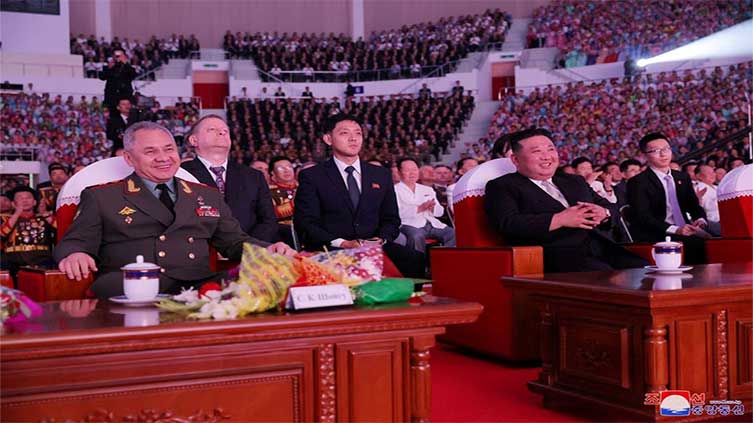North Korea's Kim shows off banned missiles to Russian minister

World
Shoigu's visit was the first by Russian defence minister to North Korea since break-up of the USSR
SEOUL (Reuters) - Russia's defence minister accompanied North Korean leader Kim Jong Un to a defence exhibition that featured North Korea's banned ballistic missiles as the neighbours pledged to boost ties, North Korean state media reported.
Sergei Shoigu, and a Chinese delegation led by a Communist Party Politburo member arrived in North Korea this week for the 70th anniversary of the end of the Korean War, celebrated in North Korea as "Victory Day".
The nuclear-capable missiles are banned under United Nations Security Council resolutions adopted with Russian and Chinese support. But this week they provided a striking backdrop for a show of solidarity by countries united by their rivalry with the U.S. and a revival of what some analysts see as their Cold War-era coalition.
In New York, U.N. spokesperson Stephane Dujarric said that while the global organization was not immediately able to analyse what was being shown, "all members of Security Council and, frankly, all member states of the U.N. share the same responsibility to uphold Security Council resolutions."
Shoigu's visit was the first by a Russian defence minister to North Korea since the 1991 break-up of the Soviet Union.
For North Korea, the arrival of the delegations marks its first major opening-up to the world since the COVID-19 pandemic.
North Korean media said Kim Jong Un "expressed his views on the issues of mutual concern in the struggle to safeguard the sovereignty, development and interests of the two countries from the high-handed and arbitrary practices of the imperialists and to realise international justice and peace."
The KCNA state news agency did not refer to the war in Ukraine but quoted Defence Minister Kang Sun Nam as saying that Pyongyang fully supported Russia's "battle for justice" and protection of its sovereignty.
'COMMON DETERMINATION TO OPPOSE WEST'
Shoigu gave Kim a letter from Russian President Vladimir Putin acknowledging that backing.
"Strong support from the DPRK for the special military operation in Ukraine, (and) solidarity with Russia on key international issues further emphasise our common interest and determination to oppose the policy of the collective West, which prevents the establishment of a truly multipolar, just world order," it read, according to Russia's RIA state news agency.
State media photographs showed Kim and his guests at a display of ballistic missiles in multi-axle transporter launchers. Another image showed what appeared to be a new drone.
"We've come a long way from when North Korea would avoid showing off its nuclear capabilities when senior foreign dignitaries from Russia and China were in town," said Ankit Panda of the Carnegie Endowment for International Peace.
He said Shoigu's willingness to be photographed with Kim on the tour was "evidence that Moscow is complacent with North Korea's ongoing nuclear modernization."
Kim also met Chinese Communist Party Politburo member Li Hongzhong for talks and was handed a letter from Chinese President Xi Jinping, North Korean media reported.
Li's visit showed Xi's commitment to the North Korea-China friendship, Kim was quoted as saying by KCNA.
State media photographs showed Kim at a large flashy performance flanked by Shoigu and Li, with a backdrop including a Chinese-army Korean-War slogan vowing to "resist U.S. aggressors".
Later North Korea held a widely anticipated nighttime military parade, an event expected to showcase its latest weapons, South Korea's Yonhap news agency reported.
U.S.-based satellite radar firm Umbra shared imagery of what appeared to be mobile missiles on parade at Pyongyang's Kim Il Sung Square.
Dave Schmerler, a researcher at the James Martin Center for Nonproliferation Studies in California, said the images, taken with technology that doesn't require light and despite heavy cloud cover, showed missile systems arranged in order, with what were likely North Korea's longest-range systems at the end.
North Korea's state media had not reported on the parade as of Thursday night.
U.S. CONCERNS
U.S. State Department deputy spokesperson Vedant Patel said Washington was "incredibly concerned" about ties between Moscow and Pyongyang.
"Russia's support for these unlawful weapons programs - by blocking additional action at the U.N. Security Council, by participating in events in Pyongyang celebrating these weapons, by failing to crack down on DPRK sanction-evasion activities - all of this just highlights how detrimental (Moscow) has become to preserving international peace and security," Patel said.
Washington says North Korea has shipped weapons including infantry rockets and missiles to Russia for use in Ukraine.
North Korea and Russia deny conducting arms transactions.
The Russian visit raises the prospect of more open support for North Korea, especially with Russia isolated by the West over its invasion of Ukraine, and one policy analyst said Shoigu's inspection of North Korean missiles suggested Moscow's acceptance of Pyongyang's nuclear-weapons programme.
"It may signify that the current geopolitical circumstances are starting to erode Russia's long-standing interest in preserving the global non-proliferation regime," said Artyom Lukin, at Russia's Far Eastern Federal University.
The simultaneous visits by high-ranking officials were a sign of a revival of the Russian-Chinese-North Korean coalition that originally existed in the late 1940s and 1950s, though now likely to be led from Beijing rather than Moscow, he added.

